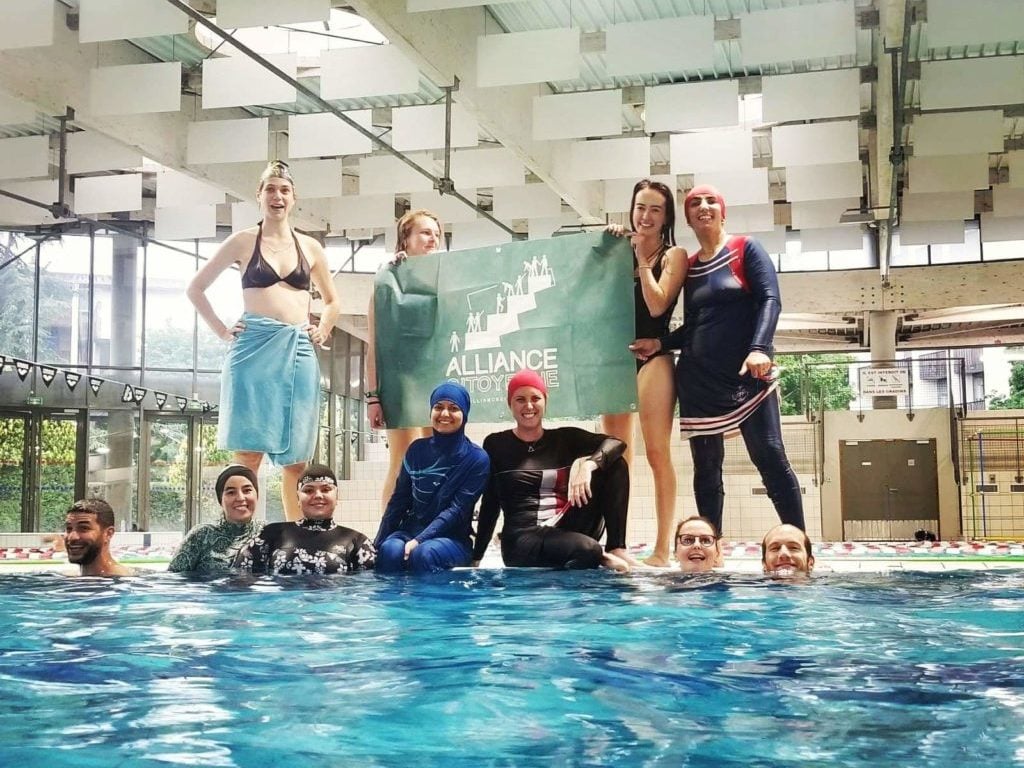
‘Burkini’ ban in Grenoble
Cliquez ici pour lire cet article en français
By Menka Sandrasagren, Administration Assistant at Minority Rights Group International
Muslim women in France have been specifically targeted by a ruling that forbids them from wearing full coverage bathing suits – or ‘burkinis’ – in public swimming pools. In June, France’s highest administrative court ruled against an attempt by the city of Grenoble to allow the bathing suit, which gives Muslim women the freedom to enjoy swimming while observing their religion.
In May, Grenoble’s City Council voted – though with only a scant majority – to allow women to wear full coverage bathing suits, as well as bathe topless, at public swimming pools. This vote was spearheaded by the city’s left-wing environmentalist mayor, Eric Piolle, who said ‘there is no reason to impose dress codes on women’. He went on to send an open letter to the French President, a month before the vote, stating that patriarchy is not the clothing a woman is ordered to or ordered not to wear, but the giving of orders itself.
Prohibiting the bathing suit in public spaces undermines women’s autonomy, a view echoed by the Office of the High Commissioner for Human Rights. The decision of the Conseil d’État, rather than guaranteeing access to public spaces for all, bars women from them.
Although Piolle obtained a democratic majority in Grenoble, backlash across France was vicious. The right-wing President of the Regional Council of Auvergne-Rhône-Alpes, where Grenoble is situated, cut all subsidies to the city. He described the move to allow the bathing suit as a total rupture with French secularism and values. Additionally, the day before the Grenoble vote, the French Interior Minister instructed an administrative tribunal to suspend the authorization of full coverage bathing suits in Grenoble, just a week before it was supposed to come into force. He did so under the principle of ‘vivre ensemble’ (‘living together’), also known as the “law against separatism”, which enshrines secularism – a central concept of the French constitution – into legislation.
A month later, the Conseil d’État upheld this view. It ruled that the city council’s vote was only aimed at satisfying a religious demand, which would undermine ‘the principle of neutrality of public services’ and affect the ‘the equal treatment of users’. Meanwhile, the withholding of subsidies to Grenoble continues.
Local authorities across France have been attempting to completely outlaw full coverage bathing suits in all public spaces since 2016. Controversy surrounding the garment can be traced back to August 2016, when women’s organization SMILE 13 announced a ‘Burkini day’ at a waterpark near Marseille. SMILE 13 rented the waterpark, organizing a day for women and children to swim, dressed in accordance with their beliefs.
When the day was announced online, politicians across the right were quick to criticize, with one claiming that ‘a certain number of Muslims voluntarily cut themselves off from our republican model and[…] put themselves on the side lines of our society.’ In the wake of the controversy, the waterpark cancelled the event. Several coastal towns banned full coverage bathing suits entirely. The burkini day became yet another talking point in a culture war stoked by right-wing nationalists since terrorist attacks in 2015 exacerbated Islamophobic divisions around secularism. The decision of the Conseil d’État to block the authorization not only comes as a huge blow to the religious rights of Muslims in France, but also to the work of many civil society organizations within the country.
One of the main proponents of the rule change had been Alliance Citoyenne, a Grenoble organization fighting social and environmental injustice. In a report critiquing arguments against the bathing suits, they claim that the term ‘burkini’ (or ‘burqini’) has been used to cement an association with the burqa, banned in France since 2008. They contend that this racializes the garment, inflaming the ongoing culture war over secularism and making the public forget that it is after all ‘just a bathing suit’.
The banning of the burqa (and any head covering) in public spaces is one of several policies touted under the banner of secularism. Others include: the senate’s ban on minors wearing a veil; the prohibition of choosing a doctor based on gender; and the ban on home schooling, all of which systematically target Muslims.
This ruling from the highest administrative court of the country has shown that France is still not ready to separate itself from rigid applications of secularism in favour of a multiculturalism that would benefit all groups within the country. It reflects the vicious culture war being waged within its politics, which has prevented women of every background from enjoying public swimming pools and all public spaces in accordance with principles of equality. After two consecutive presidential elections contested between the right and the far right, how will French Muslims and other minorities alike achieve equality?
—
Photo: People swimming pose with a banner of the civil rights organization, Alliance Citoyenne. Photo courtesy of Alliance Citoyenne. 2019.
Sign up for our newsletter to get the latest news about minorities and indigenous peoples from around the world.